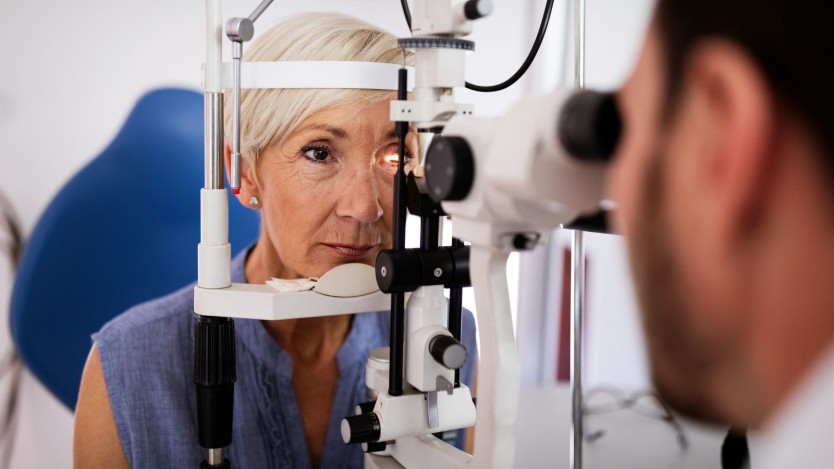
Presbyopia Surgery with Multifocal Lens replacement
- Stay in clinic: Ambulatory
- Surgery time: 15 - 20 min (per eye)
- Anaesthesia: Topical
- Full recovery: 1-2 days
Fixed price per eye
2.500 €
All included
Financing
from 98 €/month
Financing is available* for amounts over €150, and can be financed from 3 and to 24 months. The financing process is subject to approval by the collaborating financial entities. For further information on the financing conditions, please do not hesitate to contact us at +34 91 141 33 56 or through this contact form. Our Patient Service department will provide you with the information you need and explain the financing process. Find additional information about funding in the following link. *Operarme’s team manages the funding of surgical procedures and medical tests. The financing management of dental services is only performed at Caser Dental Clinics.
What do our patients think?
What is included?
-
Free surgical consultation
Book a free consultation with our eye specialist to explore your options for presbyopia surgery. Get to know the doctor, discuss your case, and decide together on the best solution for you.
-
Pre-operation study
All the specific preoperative eye tests required for the procedure.
-
Surgical procedure expenses and fees
Reservation and booking of the operation room, instruments, equipment,consumables and medication of the surgical procedure. Medication, medical gases, Stay in the postoperative recovery room, monitorization and necesary treatments. Surgeon, assistant and anaesthetist fees until your medical discharge.
If there was any special need in the surgical process, by express indication of the doctor, the client will be informed of the variation in the price prior to surgery, and must be accepted to continue with the process.
-
Outpatient surgery
Presbyopia surgery is an outpatient procedure, so you'll be able to go home the same day.
-
Medical complications insurance
Presbyopia surgery with Multifocal lens replacement includes a medical complications insurance covering possible eventualities that may affect the patient during the surgical procedure and 365 days after surgical intervention, including reoperation if needed.
Medical complications insurance covers related surgical procedure expenses, such as:
- Increase in your hospital stay after surgery.
- Hospital admission after hospital discharge due to medical complications.
- Reoperation and hospital stay up to the established amount in the particular condition.
Emergency visits and follow-up consultations after medical discharge are not covered under any circumstances.
If you woud like to receive more information about this subject, please contact our patient service department.
-
Post-surgical consultation
One post-surgical consultation is included in the fixed price of this surgery. If additional consultations are needed, they must be arranged through the patient care team at Operarme and will be charged at a discounted rate. For more information or to request an additional consultation, please contact our patient care team.
Post-surgical consultations NOT included in the fixed surgical price are charged at €39 per appointment.
Information of Presbyopia Surgery with Multifocal Lens replacement
- 01. All about Presbyopia Surgery with Multifocal Lens
- 02. What is presbyopia or eye strain?
- 03. Why does presbyopia (tired vision) occur?
- 04. Preoperative procedure for Presbyopia surgery with multifocal lens replacement
- 05. Step-by-Step: Presbyopia surgery with multifocal lens replacement
- 06. What are the benefits and risks of Presbyopia Surgery with a Multifocal Lens?
- 07. Cost of Presbyopia surgery with Multifocal lens with Operarme
01. All about Presbyopia Surgery with Multifocal Lens
Presbyopia is a very common medical condition because it is a direct consequence of aging.
As we age, just like we get wrinkles or our hair starts to turn white, the eye's lens (crystalline lens) also ages, losing flexibility. This loss of flexibility prevents the lens from properly focusing images both near and far, causing what we know as presbyopia (age-related farsightedness) and making the use of glasses necessary.
The problem lies in the fact that the use of glasses is considered uncomfortable by many people who suffer from this condition, so undergoing corrective surgery is a very appealing option.
If the goal is to solve the issue of presbyopia, the best option is surgery with a multifocal lens.
02. What is presbyopia or eye strain?
Presbyopia, or age-related farsightedness, is the loss of the ability to focus on nearby objects. This vision problem is very common and is due to the aging of certain eye structures responsible for focusing images.
Presbyopia, or tired vision, is therefore a normal condition that will affect us all at some point in our lives, just like getting wrinkles or having our hair turn white. It is important to clarify that presbyopia is caused by age and not by excessive use of the eyes.
The patient leaves the hospital immediately after surgery, walking out on their own feet and with the eye uncovered.
Presbyopia typically begins to appear between the ages of 35 and 50, depending especially on whether the patient previously suffered from some other type of refractive defect for distant vision. It is worth mentioning that presbyopia will not go away with time; on the contrary, as we age, it will inevitably increase. In many cases, this problem is solved with simple reading glasses, or if the patient also has difficulty seeing at a distance, progressive glasses.
Although it is normal and most people naturally start using glasses, in many other cases it becomes a limitation for both professional and personal life.
Therefore, many people choose to address the problem to avoid wearing glasses. Rejuvenating or repairing the ocular structures whose aging causes presbyopia is not possible today. However, it is possible to trick the eye by using an intraocular lens that helps focus up close and allows the patient to significantly or completely avoid using glasses.

In these cases, the most common procedure to solve presbyopia is surgery with a multifocal lens (presbyopia surgery), which mainly involves replacing the eye’s natural lens with a multifocal intraocular lens.
Additionally, before undergoing surgery, it is important to have a prior consultation with an ophthalmologist to decide on the most appropriate procedure to solve this troublesome problem.

Do you need presbyopia surgery with multifocal lens replacement?
Request a free and immediate appointment with our specialists
03. Why does presbyopia (tired vision) occur?
Unlike other refractive defects such as myopia, hyperopia, or astigmatism, presbyopia is directly caused by aging and the loss of flexibility of the eye's lens.
Presbyopia affects a high percentage of people over 45 years old and 100% of those over 65.
The lens, which is an ocular element located behind the iris and pupil, is what allows the eye to focus the light it perceives onto the retina, which then sends this information to the brain through the optic nerve. Once in the brain, it interprets what we know as images of reality.
As we age, a series of changes occur in the proteins that, along with water, form the lens, making it increasingly rigid and less flexible. At the same time, the muscles that hold the lens also lose flexibility. This overall loss of flexibility prevents the lens from adjusting to focus on nearby objects. A clear symptom of presbyopia is when older individuals need to move a book or mobile phone away from their eyes to read what is written.
Full visual recovery may take between 24 and 48 hours, with the patient able to return to normal activities 2-3 days after surgery.
To avoid the need for glasses, the best option is presbyopia surgery with a multifocal lens.
04. Preoperative procedure for Presbyopia surgery with multifocal lens replacement
During these preoperative consultations, the surgeon will perform a series of tests on the patient to assess the characteristics of the eye and ensure the surgery is carried out with the utmost safety and precision.
Usually, the tests conducted by the surgeon are:
- Thorough eye examination
- Pupilometry and intraocular pressure measurement
- Refraction with and without dilation
- Orbscan topography
- IOL Master biometry
- Specular microscopy
In addition to these ophthalmological tests, the surgeon will ask the patient for information about any previous eye surgeries and the use of medications or dietary supplements.
They will also discuss the suitability of using monofocal, bifocal, or trifocal lenses, depending on the patient’s lifestyle. In this case, the most recommended option is the multifocal lens, being the most common.

The surgeon will prescribe antibiotic eye drops for the patient to use in the days leading up to the procedure to prevent possible infections.
The ophthalmologist will also advise the patient not to wear contact lenses for the week or ten days prior to surgery and to avoid using cosmetics or makeup around the eye area a couple of days before the procedure.

Do you have presbyopia and need surgery?
Request a free and immediate appointment with our specialists
05. Step-by-Step: Presbyopia surgery with multifocal lens replacement
The surgical technique used to perform presbyopia surgery with a multifocal lens is the same as the one used for cataract surgery, called phacoemulsification.
Hospitalization is not required for this procedure, and it is performed under local or topical anesthesia, which can be administered through injections or eye drops. The patient will remain awake during the surgery but will not feel anything.
The patient arrives at the hospital shortly before the surgery and is prepared with anesthesia to begin the procedure. The patient is placed in a special chair, and the operation begins.
- Once the anesthesia takes effect, the surgeon will make a small incision at the edge of the cornea.
- After that, the ophthalmologist will insert a small probe through the incision. Upon reaching the lens, the surgeon will dissolve it using ultrasound waves emitted from the probe. It is important to remember that the lens is made of water and proteins, so its dissolution is relatively simple.
- Once dissolved, the remaining liquid is removed using a small cannula.
- The next step is to insert the multifocal lens into the area where the lens used to be, using an extremely small instrument. This is possible because the materials used to make intraocular lenses are very flexible, allowing them to be folded and then inserted into the eye. Once in the area where the lens used to be, the lens is placed in the exact location. Over time, this lens will become a natural part of the eye and will be completely imperceptible to the patient.
- Finally, the surgeon may place a series of tiny sutures in the patient’s eye to assist with the healing of the incision, although it is also possible to leave it as is and allow it to heal on its own.
The duration of presbyopia surgery with a multifocal lens is approximately 15 to 20 minutes, and the patient can leave the clinic on their own feet with the eye uncovered shortly after the procedure.
06. What are the benefits and risks of Presbyopia Surgery with a Multifocal Lens?
The main advantage of presbyopia surgery with a multifocal lens is that it allows the patient to lose their dependence on glasses in most situations. The use of multifocal lenses enables the patient to see at different distances without the need for glasses, unlike monofocal lenses, which only improve vision at a single distance.

Another advantage of presbyopia surgery with a multifocal lens is that it eliminates the possibility of cataracts forming, as the replacement of the natural lens with an artificial one prevents its aging.
As for the risks of presbyopia surgery with a multifocal lens, they are the same as any other ophthalmological intervention, although they are unlikely. Among the risks, we can mention problems with anesthesia, whose risk is reduced through prior patient assessment; intraocular bleeding; increased blood pressure within the eye (glaucoma); retinal inflammation; and complete or partial loss of vision.
Despite the potential risks of presbyopia surgery with a multifocal lens, it is a very common procedure that surgeons perform with great ease.
07. Cost of Presbyopia surgery with Multifocal lens with Operarme
The price of Presbyopia Surgery with Multifocal Lens is all-inclusive and fixed, meaning it covers everything necessary to carry out the procedure with the highest possible safety, further guaranteed by the hospital’s quality and the specialist’s experience.
The price of the surgery with Operarme is 2.500 €, per eye.
This price includes:
- Reservation and use of the operating room
- Postoperative check-ups during the 30 days following the procedure
- Medical fees
- Anesthetist fees
- Nursing team fees
- Surgical materials needed for the procedure, including the intraocular lens
- Anesthesia and recovery room reservation
- Medical complications insurance, which covers any potential issues that may arise, although they are very uncommon
If you’d like more information about this surgery or about how Operarme works, don’t hesitate to contact us through our contact form, by calling at +34 91 141 33 56, or request a free surgical assessment consultation with our Ophthalmology Specialists by clicking below:

Do you have presbyopia and need surgery?
Request a free and immediate appointment with our specialists
Fixed price
2.500 €
All included
Financing
from 98 €/month
Financing is available* for amounts over €150, and can be financed from 3 and to 24 months. The financing process is subject to approval by the collaborating financial entities. For further information on the financing conditions, please do not hesitate to contact us at +34 91 141 33 56 or through this contact form. Our Patient Service department will provide you with the information you need and explain the financing process. Find additional information about funding in the following link. *Operarme’s team manages the funding of surgical procedures and medical tests. The financing management of dental services is only performed at Caser Dental Clinics.
Step by step
-
Ask for a free consultation with our specialist in Ophthalmology.
-
Information will be sent to your email address.
-
We will call you to confirm the date.
-
Meet the doctor and decide if you would like to have the surgical procedure with us.
-
Correct your presbyopia problem and regain your quality of life.
What do our patients think?
Frequent Questions
-
Do you have questions? Get free advice on contracting our medical services
Before requesting an appointment with our specialist, you may want to know a little more about the entire process in Operarme. Therefore, we offer you a free advisory service so that you can resolve any questions you may have:
- How is the surgery managed?
- What services are included?
- Can it be financed?
- What should I do if I don't have medical tests or reports ?
- What advantages do I get being an Operarme's patient?
Request the service by clicking below and our patient service team will contact you in less than 24 working hours. This service does not imply commitment to contract our services. Do not hesitate and request our assessment by clicking here:

Free Assessment for Contracting Medical Services
Operarme’s Patient Service will contact you and solve all your questions on the medical service you need.
Request information Request information -
Do I have to take a PCR test before surgery?
Currently our collaborating hospitals and surgeons do not ask patients to take a PCR test as a mandatory requirement to enter the operating room.
If exceptionally this test would be required by the hospital or surgeon, we inform you that the PCR test is not included in the price of the surgery.
If you have any questions about this specific issue, please contact our patient service department.

Presbyopia Surgery with Multifocal Lens replacement
- Stay in clinic: Ambulatory
- Surgery time: 15 - 20 min (per eye)
- Anaesthesia: Topical
- Full recovery: 1-2 days
Fixed price
2.500 €
All included
Financing
from 98 €/month
Financing is available* for amounts over €150, and can be financed from 3 and to 24 months. The financing process is subject to approval by the collaborating financial entities. For further information on the financing conditions, please do not hesitate to contact us at +34 91 141 33 56 or through this contact form. Our Patient Service department will provide you with the information you need and explain the financing process. Find additional information about funding in the following link. *Operarme’s team manages the funding of surgical procedures and medical tests. The financing management of dental services is only performed at Caser Dental Clinics.


